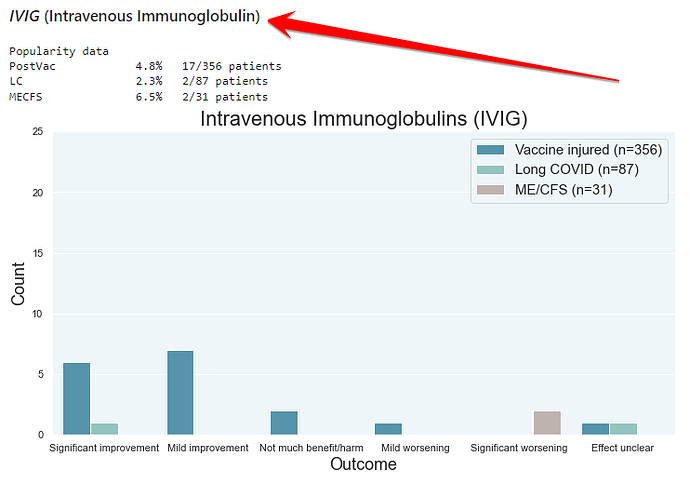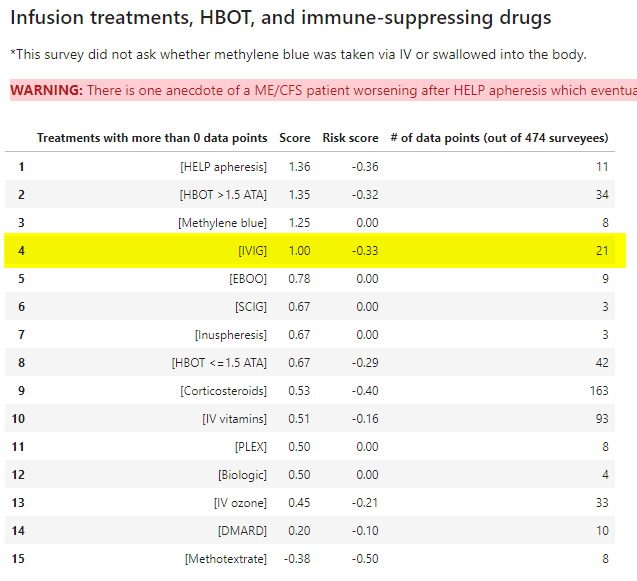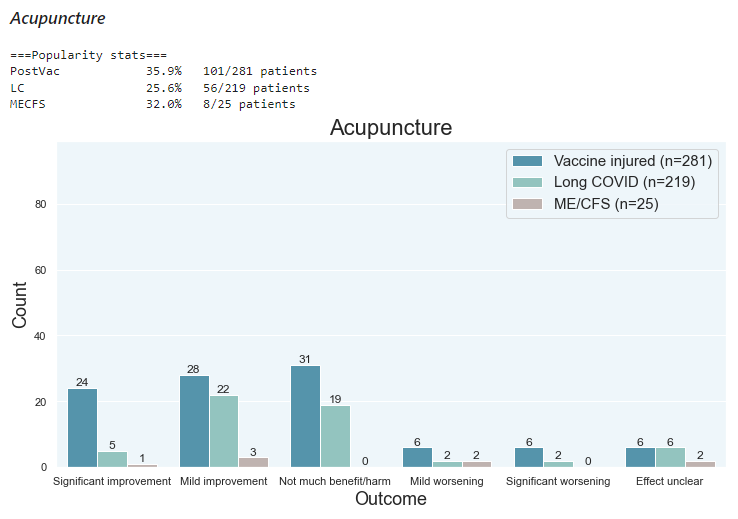I have a data dump of survey data here:
- Patient Experiences Survey: longhaulwiki.com/pes/
- Treatment Outcomes Survey: longhaulwiki.com/treatment-outcomes/ ← While this data set is older, it has more data on IVIG and the demographics are quite different.
Use the search feature on the name of the treatment that you want to find data for.
- Desktops: Hit Crtl + F (⌘+F) in your browser.
- Mobile: Tap and hold on your web browser app (while in the app). The search function will have a name like “Find Selection”.
If you keep hitting next, eventually you’ll find a section where the title has various different names for the same treatment.
The phrase in italics is what you should be searching for. This will let you find all of the data and analyses available for that treatment.
The bars for worsening indicate people who reported bad experiences with that particular treatment. The data on worsening can help you get a feel for the risk of a treatment. Unfortunately there is often a disconnect between what clinicians/patients say and what people are reporting on the survey.
Comparisons with ‘similar’ treatments
Sometimes there is a section where the treatment is grouped with other similar treatments. This lets you compare IVIG to somewhat similar treatments. You can see:
- How popular these treatments are
- How ‘risky’ they are (how often people report bad experiences)
- -3 points for significant worsening, -1 point for mild worsening, 0 points for everything else)
- The score for that treatment.
- 3 for significant improvement, 1 for mild improvement, 0 for about the same, -1 for mild worsening, -3 for significant worsening, 0 for effect unclear.
In the chart above, you can see that maybe you don’t want to waste money on IV ozone or IV vitamins until you try high pressure (>1.5 ATA) HBOT first. Of expensive treatments out there, IV ozone may not be the best use of your money unless you’ve failed other treatments.
Survey data can be unreliable
Sometimes people interpret questions in weird ways. This can cause a small portion of the surveyees to answer a completely different ‘question’ than everybody else. That leads to bad data.
There are also biases in the way people report the outcome of a treatment.
The short story is that survey data can be unreliable. Data from (honest) randomized controlled trials (RCTs) is more reliable but they take money to pull off. We have very little RCT data unfortunately.
What survey data is good for
If something has more than 10 results in the survey data, then it’s probably not a magic cure. Nothing on the survey was a magic cure. That’s just how it is. Of course, not all treatments were surveyed.
In general, you’ll see that a few people will report really positive results for every treatment. That’s why “everything works” when you go to the support groups.
What helped people recover
In the Patient Experiences Survey data dump (longhaulwiki.com/pes/), there is a section titled ’ All 235 treatments surveyed’.
The third column shows the percentage of people who recovered AND reported significant improvement from the treatment. Anything higher 1.2% suggests that the effect may be non-random and that the treatment may have medically helped (as opposed to people answering the survey in weird ways or believing that the treatment works when it doesn’t).
Count shows the number of ‘recoveries’. A count of 1 is unreliable because the sample size is very small.
Another survey analysis
Another way of looking at the same survey data can be found here:
What was the treatment that helped the recovered the most?
See this post for a list of those treatments.
- Fasting (different forms) - 6
- Ivermectin - 3
- NAC - 3
- Note that about half of the people on the survey tried NAC. After adjusting for popularity, it may not be as good as it first appears (e.g. 1% success rate).
- Exercise - 2
- Exercise was even more popular than NAC, so interpret with caution. Most people respond negatively to exercise, even if it is light.
- Nattokinase - 2
- HBOT - 2
- Time - 4, no answer/treatment - another 4
Score has limitations
I wouldn’t put too much weight on the average score. It’s heavily affected by how people fill out surveys. It is possible/likely that survey-answering biases have a bigger impact on the data than how good a treatment is.
The data is more reliable for negative experiences… there tends to be a lot less bias there. If a high percentage of people are reporting negative experiences then the treatment has some risk to it.
You can search Reddit, Facebook, Phoenix Rising, etc.
There are various chronic illness support groups on social media. Searching these groups can be useful for treatments that aren’t on the survey, e.g. plasma donation.
The Phoenix Rising forum for ME/CFS patients is another place too look for information: https://phoenixrising.me/
If you want to know about highly experimental treatments like GS-44 and BC007, patients are generating anecdotes on those treatments. However, there currently isn’t an easy way to find those anecdotes. But hang out on Discord and you’ll eventually figure out how to get that information. Join these Discords:
- Joshua Leisk’s discord: BornFree.life
- Discord
Treatments for specific symptoms
There is data available for:
- Pain
- Food intolerances or allergies
- Severe depression
- Sleep issues
- Brain fog, memory problems, or cognitive difficulties
- POTS or feeling faint when you go from lying down to standing
See the video (A data-driven approach to Long COVID and COVID vaccine injury treatment (November 2022)) and/or the slides in the video description. Skip ahead to the targeted treatments section if necessary.
I hope this helps
Now you can get quick answers to most of your questions. People have tried a lot of things and the results are usually mixed, with good experiences for some and bad experiences for others.



